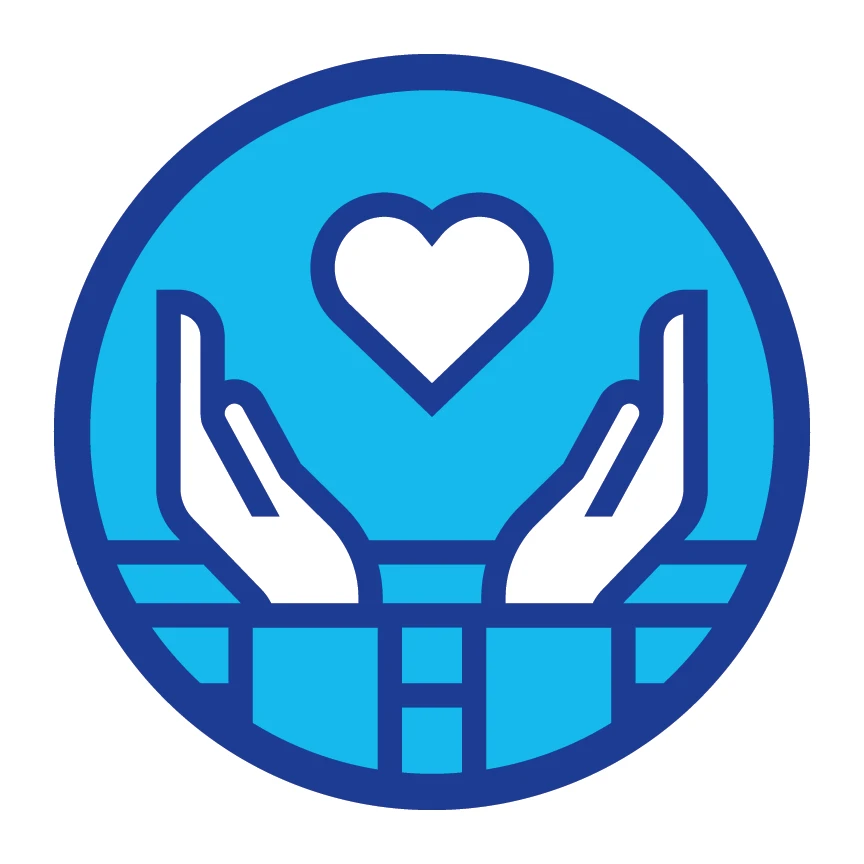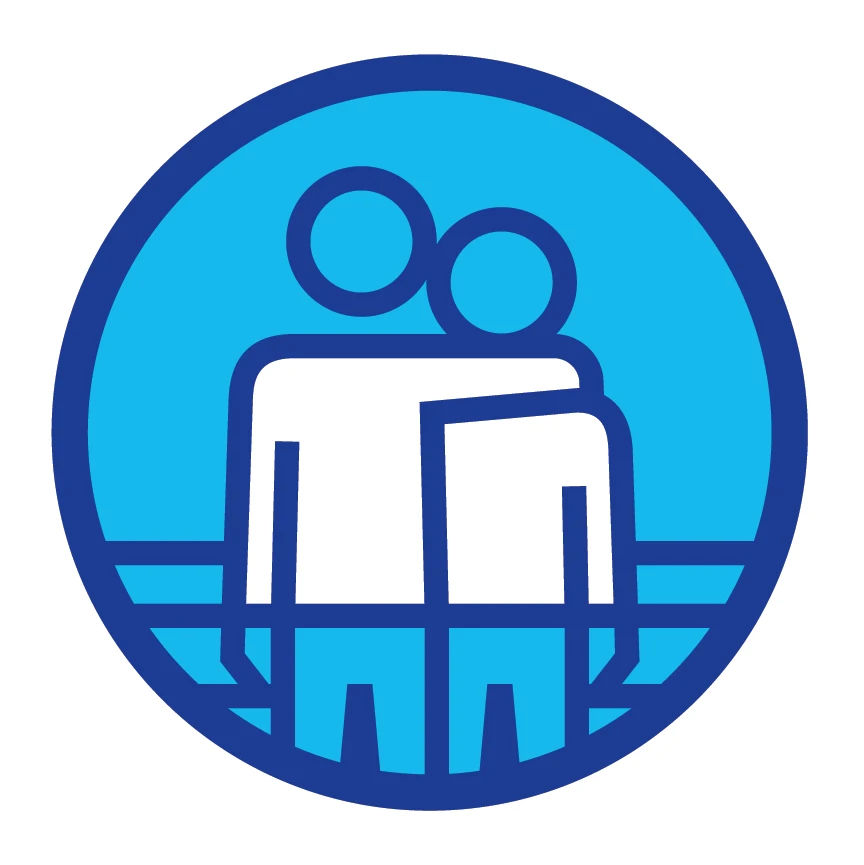Frequently Asked Questions
Stillwater Hospice has set the standard for patient care since our founding in 1888. We have been providing hospice services since 1983, the first agency in the region to provide this specialized care.
Our not-for-profit, community-based, patient-centered care is available in 12 counties in northeast Indiana. Our palliative and hospice care are available to anyone of any age who is facing serious illness.
Hospice Care
Hospice care provides comfort and support to patients with advanced illness and their families. The goal of hospice care is to improve the quality of life for patients by addressing each patient’s physical, emotional, psychological and spiritual needs. Considered to be the model for quality, compassionate care for people facing a life-limiting illness, hospice care involves a team-oriented approach to deliver expert medical care, manage pain, and support emotional and spiritual needs expressly tailored to the patient’s needs and wishes.
No. It is care for any life-limiting illness, including but not limited to cancer, COPD, stroke, Parkinson’s disease, dementia, ALS, cardiac/heart disease, lung disease, renal failure, liver disease, and many others.
When the patient is no longer seeking curative treatment and comfort is the primary goal.
Hospice care is available for those patients with a life expectancy of six months or less if their disease process runs its normal course. The earlier care begins, the greater the benefits to the entire family.
Referrals are accepted from the patient, a family member, the patient’s physician, a hospital, a long-term care or assisted-living community, clergy, a friend or a community agency or other referral source.
Once the call is made, admission can be the same day.
Hospice physicians work closely with each patient’s personal physicians to determine a hospice plan of care to meet each patient’s individual needs.
If a person changes his or her mind about hospice care, he or she can be discharged from hospice and seek curative treatment again. Patients do not lose their Medicare benefits if they are discharged from hospice care to resume curative care.
The hospice benefit covers all care related to a patient’s terminal diagnosis. This includes routine home visits by a nurse, social worker, spiritual care counselors, and certified nursing assistant. Other members of the hospice care team include a dietitian, volunteer, pharmacist and hospice medical director. A physical and occupational therapist may be consulted. If appropriate, the hospice benefit also covers all medications related to the terminal diagnosis, along with medical supplies, equipment and some personal care items. Nutritional supplements as directed by the dietician or physician are also covered. While not all hospices offer integrative therapies, Stillwater Hospice provides music therapy, massage and animal activity visits.
Hospice Home
Hospice Home is northeast Indiana’s only freestanding inpatient hospice facility. Patients whose symptoms may need intensive monitoring are supported 24 hours a day by trained hospice caregivers. In 2021, Hospice Home celebrated 20 years on the Stillwater campus on Homestead Road in Fort Wayne, IN. More than 12,000 people aged 5 months to 103 have been served by Hospice Home since it opened in February 2001. A $1.7 million renovation project completed in 2024 added new comforts for patients and their visiting loved ones.
Palliative Care
Palliative (pronounced pal-lee-uh-tiv) care is specialized medical care for patients with serious illnesses who may be seeking curative treatment and can benefit from extra assistance and supportive care. This type of care is focused on providing relief from the symptoms and stress of a serious illness.
We will work together with your other doctors to manage your symptoms and distress, help you better understand your disease and diagnosis, help you clarify your goals of treatment and your options, support your ability to cope with your illness, and assist you in making medical decisions.
Yes, absolutely. Your treatment choices are up to you. You can have palliative care at the same time as treatment meant to cure you.
Chronic Disease Management
Stillwater Hospice provides skilled home health care and rehabilitation in your residential home and assisted and independent living communities. We work collaboratively with facility staff to ensure that you are receiving coordinated care.
If you have been diagnosed with a serious chronic illness, such as COPD, congestive heart failure or diabetes, and need assistance with activities of daily life, you may be eligible for our supportive services.
Specialty Programs
At Stillwater Hospice, our goal is to encircle the patient and family with a holistic approach to care. Music and massage therapy offer comfort to patients and their families, and animal therapy visits are enjoyed at Hospice Home. Our Volunteer Department offers several specialty programs, including Pet Peace of Mind, which helps care for beloved pets of our patients.
Stillwater Hospice is proud to serve veterans. Approximately 25 percent of our patients are veterans of the armed forces. We are a Level III Partner in the national “We Honor Veterans” program, and our trained veteran volunteers are available to meet with our veteran patients to share their unique experiences.
Grief Support
Yes. Families continue to be supported for 13 months or longer after the passing of their loved one. Trained grief counselors provide individual counseling, group sessions and other support services at the Peggy F. Murphy Community Grief Center, located on the Stillwater Hospice campus, and at locations throughout the community.
Grief services at the Peggy F. Murphy Community Grief Center are open to any adult in northeast Indiana who has suffered the death of a loved one. Hospice involvement is not required. In fact, two out of three grief support clients have had no involvement with hospice.
Individual and group grief counseling is available at no charge to the grieving person, thanks to the generous support of donors throughout the region.
Financial Resources
Medicare, Medicaid and private insurance generally pay for palliative and hospice care. Those who do not have the ability to pay for their care can still receive services because of the generous support of donors in our community who support Stillwater Hospice’s financial assistance program.
Most insurance plans cover all or part of palliative care, just as with other hospital and medical services. This is also true of Medicare and Medicaid. If costs concern you, a social worker or financial consultant from the palliative care team can help you with payment options.
Care Team
Stillwater Hospice’s care team includes hospice-certified physicians, nurse practitioners, nurses, CNAs and LPNs. It also includes nondenominational spiritual care counselors, social workers, and volunteers who help families navigate the turbulent waters of serious illness.
Common Myths
Palliative (pronounced pal-lee-uh-tiv) care is specialized medical care for patients with serious illnesses who may be seeking curative treatment and can benefit from extra assistance and supportive care. This type of care is focused on providing relief from the symptoms and stress of a serious illness.
Myth: Palliative care hastens death.
Fact: Palliative care does not hasten death. It provides comfort and management of symptoms like pain, nausea and anxiety as patients seek curative treatments.
Myth: Taking pain medications in palliative care leads to addiction.
Fact: Keeping people with serious illnesses comfortable may require adjustments of the doses of pain medicine. This is a result of the tolerance to the medication the body develops, not addiction.
Myth: Only patients can benefit from palliative care.
Fact: Everyone can benefit from palliative care, including family caregivers. Studies have shown that family caregivers report less stress when their loved one is receiving palliative care, as symptoms are reduced and quality of life improves.
Hospice care is a comprehensive plan of care provided by a team of medical experts that allows patients and their families to focus on living as fully as possible and sharing meaningful moments with their loved ones. More than 1.7 million Americans entered hospice care in 2023, but many people may still have misconceptions about what quality community-based hospice is.
Myth: By choosing hospice, you are “giving up.”
Fact: In choosing hospice, you are choosing to live the remainder of your life on your own terms, as comfortably as possible. Hospice allows families to have meaningful moments together as the patient and loved ones are supported.
Myth: Hospice is only for the last few days of life.
Fact: Patients and their families can receive hospice care for six months or longer, depending on the course of the illness. The sooner you begin hospice care, the sooner you can receive the benefits of symptom management and support. In fact, many of our families have told us they wished they had called hospice sooner in the patient’s illness.
Myth: You can’t keep your doctor if you choose hospice.
Fact: Stillwater Hospice’s hospice physicians work with you and your doctors to develop an individualized plan of care.
Myth: Hospice care is only for people with cancer or AIDS.
Fact: More than half of all hospice patients are enrolled in hospice with a diagnosis other than cancer. Hospice is for any person whose illness or injury means they have a life expectancy of six months or less if the disease or condition runs its expected course. That includes patients with congestive heart failure, COPD, ALS, Alzheimer’s and other end-stage neurological diseases, stroke, and liver and renal disease. Palliative care, which provides symptom management while a patient is continuing to seek curative treatment, is also available to patients, and patients who seek palliative care can then elect hospice later as their disease progresses.



